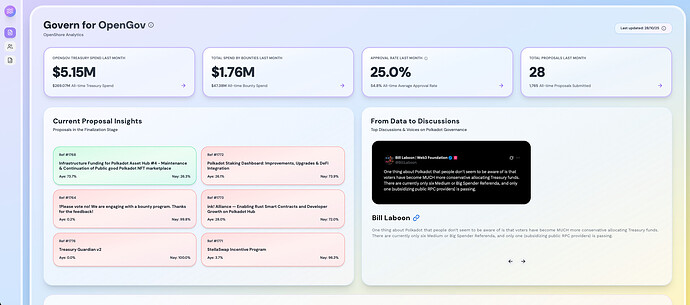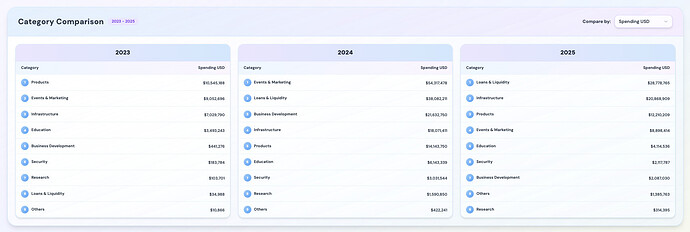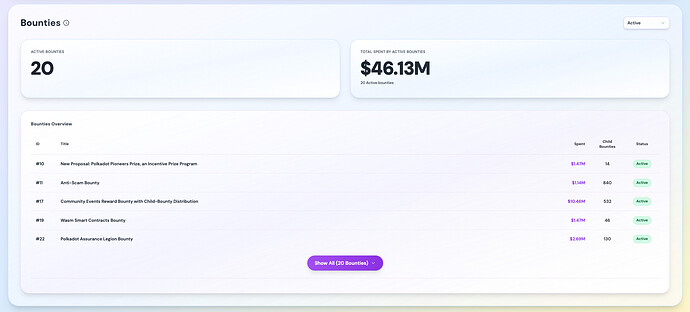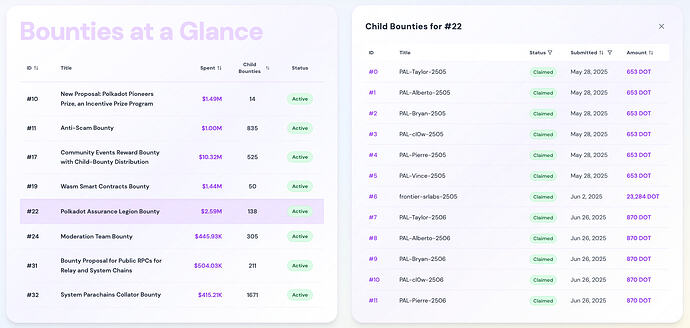TL;DR
Explorers show what happened. OpenShore shows what it means.
- From data to information: New simplified categorisation of all-time OpenGov spending with near real time data. Can be automated with human in the loop (low maintenance).
- Enables OpenGov Budget(ing): With near real time spending and comparison insights, we can create a community-led budget to act upon specific goals in 2026.
- Proposer and voter due diligence: Proposer and voter track records, cross-referenced with category and put into comparison aims to support better and faster voting on proposals.
- Automated Bounty Reports: Transparent summaries analysing and summarising on-chain data of bounties to serve as a community voice if someone wants to speak up publicly and at the same time enhances trust in bounty activity.
- Budget and Forecasting: Community will be able to set and track spending targets in near real time.
Our goal is to advance digital sovereignty with transparency for on-chain governance and demonstrate that decentralized decision making can be strategic and community-led.
Polkadot OpenGov can serve as a role model in this digital governance development.
OpenShore In Detail
After implementation of the full version of OpenShore and automation of selected processes, there will be low maintenance with manual intervention only for important checks and updates to minimize maintenance cost, and maximize durability.
OpenShore goes further with OpenGov data analysis and produces useful and neutral insights to introduce more efficient voting and OpenGov spending. OpenShore does not reproduce work from other tools but follows its own logic aimed at creating a near-real-time data insights tool for our community.
With support of OpenShore we further aim to initiate
-
New Transparency & Community-led Efficiency Narrative for Polkadot:
OpenShore as OpenGov’s OS can create a data-driven, transparent short report of arguably the world’s biggest DAO experiment. OpenShore analytics and Insights will be summarised in the short report and shared with Pala’s contact database of 5,450 devs, students, journalists and investors to showcase community-led fiscal discipline. Also planned a PR-wire article with the support of Marketing Bounty, aims to make the news reach mainstream media. -
Initiate discussion on community-led OpenGov budgeting for 2026 for proactive and not reactive spending, also based on analysis and research of OpenGov and other ecosystems etc.
Integration with other community tools: OpenShore features its own logic, data analysis, metrics, tools and more. At the same time, it aims to work along with and complement the efforts of other explorers and treasury reports. Openshore will provide an API, which can be used by the community and other tools, as well as a voting tool extension, which can be used in parallel to voting on Subsquare and Polkassembly.
Try it out now: OpenShore MVP (Live). Mobile version and automated data updates to be added in future development.
The OpenShore OpenGov proposal is coming soon.
What Is OpenShore?
Explorers show what happened. OpenShore shows what it means.
Our goal is to help OpenGov operate more strategically, efficiently, and make it accessible while communicating that progress to the broader web3 and web2 audience.
OpenShore Targets Following On-chain Governance Challenges
• Fragmented context: key signals are scattered across threads, explorers, and dashboards.
• Slow or uneven due diligence: repeated manual checks create inconsistent evaluations.
• Limited comparability: it is hard to see patterns across categories, proposers, and time windows.
• Lack of positive spending narrative: Polkadot governance discipline is not always visible to newcomers and externals. Furthermore, the wasteful spending in the past has created a negative narrative for our community - which we aim to combat with fact-based insights and on-chain backed transparency.
Four Pillars Of OpenShore
1) From raw OpenGov data to clear information
• New simple categorisation for all OpenGov spending, manually checked all referendums to ensure correctness.
• When we categorise, label, summarise and analyse spending behavior as well as proposer and voter behavior, we can recognise patterns and bias, which can help us improve status quo and start spending more goal based.
• Numbers in context put findings into perspective, e.g Loans & liquidity represent 2% of total proposals but have been allocated 25% of all treasury funds (~67 million USD).
• Ranking for categories across multiple metrics, which makes it possible to see the development of certain categories throughout time and encourages the reader to compare the spending with the impact reality of some categories.
• Data accuracy: MVP Data sourced from Subquery Indexer and Subscan API, for the full version an archive node will be set up.
2) Enable active budgeting for the treasury
It is becoming increasingly important to allocate spending on OpenGov goal-based and not only reactive. As allocation with focus on specific areas, will support our ecosystem growth and efficiency. We initiated the discussion for OpenGov 2026 budget with key governance voices and hope to share an update soon.
OpenShore can incorporate budget decisions and help make goal-based proposal voting for voters easier.
3) Voting Tool alongside Polkassembly and Subsquare
• Context where you vote with a window in a window companion or extension that surfaces live stats while you review and submit your vote.
• Proposer and voter track record at a glance, including track record and category-based proposing history, as well as the true receivers of funds after receiving funding.
• Faster decisions by replacing tab hopping with a single tool.
4) Automated Bounty Analysis & Reporting aims to help speak up as a ‘neutral community voice’
• Several community members on the Forum have been voicing concerns regarding some bounties. To provide a ‘point of truth’, which is based on facts and not subjective opinions, we aim for OpenShore to become a community voice for all of us and removing the need for community members to expose themselves and become ‘whistleblowers’. At the same time, the tool supports efficient and transparent bounties to gain community trust.
One click reports that generate clear spending summaries for a selected bounty or bounties per time period.
• Spend and status slices with filtered CSV or JSON exports for researchers and media.
• Always current views with near real-time updates backed by a verifiable data pipeline.
What’s Live In The Demo
- OpenGov Status Quo & Analysis: Recent spending snapshots, approval rates, proposal counts, and current referenda with vote splits as well as refs impact on respective categories.
- Category Distribution and Rankings: Executed proposals by category/subcategory (e.g., Infrastructure, Loans/Liquidity, Products → Wallets).
- Current Proposal Insights: Latest live referenda with aye/nay percentages and short descriptors.
- Entity/Ranking Views: Top voters and active entities with participation stats.
- Bounty Activity Overview: Active programs with high-level spend and child-bounty counts (status only; no funding details). (This is not the analysis or report tool).
- Voting Insights: Unique voting addresses trend, voting participation by DOT holdings etc.
- Search & Filters: Navigate by category, entity, and timeframe.
- OpenShore Voting Tool, with search function for wallet address and proposer identity, which can be used by voters for a quick and reliable due diligence on proposers/voters/refs.
Future Roadmap & Features and what we are building next
Mobile/Tablet Compatible Version
Better, Faster & More Data:
- Instead of updating every few weeks, we’re building a system that updates continuously. You’ll see governance activity as it happens on-chain.
- Additionally, we plan to expand our data arsenal by adding more SubQuery services and potentially our own indexing node alongside Subscan to enrich our data sources. This means more detailed data, better accuracy and a greater variety of insights on OpenGov topics.
- For example: Delegations, Voting Patterns, ROI Analysis, etc.
Create & Export Reports
- Export reports as CSV files from a curated list of datasets for your own analysis. Whether you’re doing research or preparing a presentation, the data is yours to use.
Chrome Extension
- Get bounty alerts and check voter insights without opening a new tab. The extension will even let you view OpenShore data while browsing other governance sites, making it easier to verify information and make better decisions.
Public API For Developers
- We plan to create a public API documentation with code examples so developers can use OpenShore data for their own tools. Integrate governance insights into DApps, hackathons or research projects seamlessly.
Who Is It For
• Voters and delegates
• Builders and proposers
• Journalists, Analysts and researchers
• Community newcomers
How This Strengthens Polkadot
OpenShore turns governance activity into a shared context that helps the community set priorities, compare options, and explain decisions. By pairing rigorous analytics with clear storytelling, we aim to make OpenGov both easier to use and easier to understand from the outside.
Credits & Contact
OpenShore is developed by Pala Labs for the Polkadot DAO. If you have suggestions, please reply in this thread with specifics (field names, filters, example links). We’ll incorporate actionable feedback into upcoming iterations.
Call For Feedback from forum readers and OpenGov participants:
- Additional datapoints What data points would you expect on proposal and entity pages?
- Must-have filters: Which combinations do you use most in reviews (e.g., track + subcategory + date range)?
- Taxonomy gaps: Any tags or subcategories you’d add or rename for clarity?
- Review/retro views: What would a perfect post-execution page include for your workflow?
- Export and API Options
AMA call offer
If you want to talk with us directly, please join our open AMA call on Monday, 3rd November at 17:00 (GMT+8).
Thank you and let’s meet at the OpenShore!
Explore the demo: OpenShore MVP (Live)








